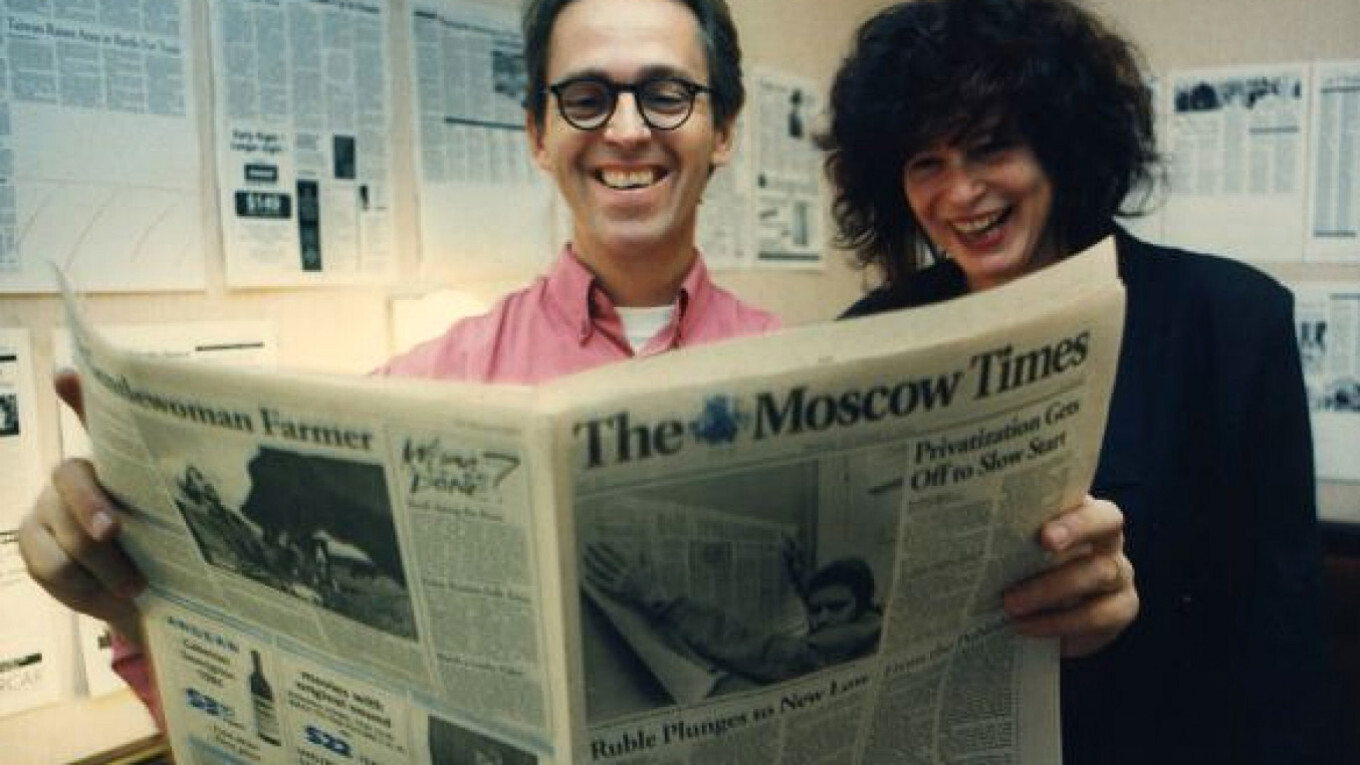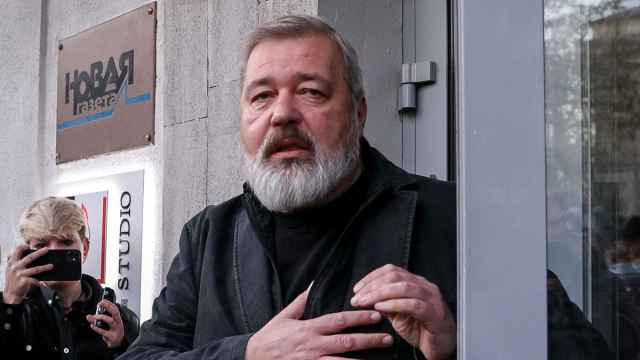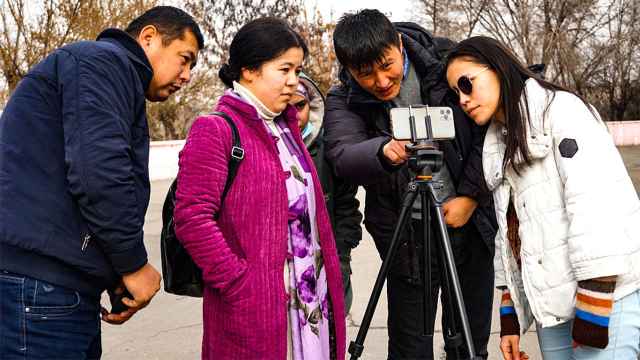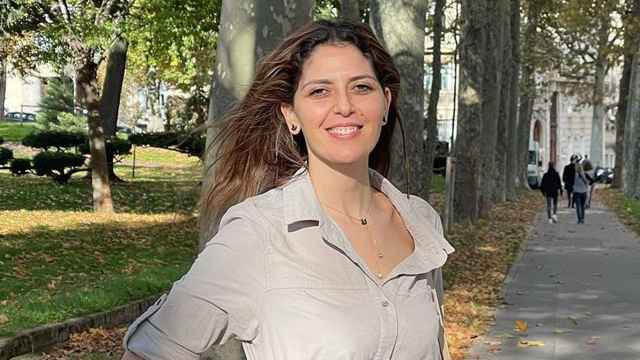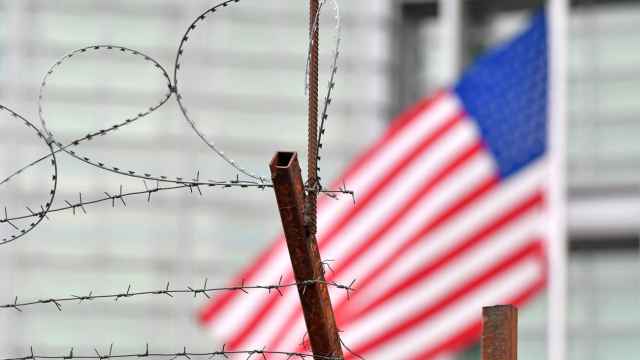When Derk Sauer founded The Moscow Times in 1992, he founded a newsroom that would serve as a training ground for generations of journalists, many of whom have gone on to work for major international publications.
We asked alumni of The Moscow Times, from its earliest days on Ulitsa Pravdy to its present-day life as a digital news outlet, to share their memories of working with him:

The Moscow Times was my first job in journalism. I applied for a job in November of 1993, shortly after Yeltsin stormed the White House, and was hired as a copy editor. Copy editors are always an interesting crowd, but the copy desk at The Moscow Times was an astonishing collection of oddballs and adventurers, several notorious beauties and at least one person I am fairly sure was a fugitive from justice. I had not planned to stay in Russia, but I didn't use the return portion of my round-trip flight from JFK, and I ended up staying for two and a half years.
The people Derk had assembled at The Moscow Times were, in many cases, accidental journalists — the foreigners were interested in Solzhenitsyn or Vysotsky, not journalism careers; the Russians had grown up in an environment where there was no real journalism. But he put us all under the authority of Jay Ross and Meg Bortin, who really knew what they were doing. They created a sound structure, with high journalistic standards. We corrected our errors. We buttonholed Duma deputies in the hallway outside their offices. We printed stories that angered powerful people. ("I like your newspaper," one terrifying man told me. "I would hate to see it go away.") The foreign correspondents for big papers — I know this, because later I was one of them — read The Moscow Times every morning and then pitched stories to their editors in London and Washington and New York, and in this way, the tiny newspaper Derk created shaped the world's view of post-Soviet Russia.
So much of this was just an extension of Derk's bravery and sense of adventure. For a time, against all odds, he created a space where it was possible to print the truth.

I joined The Moscow Times in the fall of 1993, a russophile who stumbled into journalism rather than the other way around. By then the paper had already moved to its offices on the legendary Ulitsa Pravdy — a scrappy, boisterous newsroom adjoined by a long hallway of offices and, most wondrous of all in retrospect (besides the Truth Street address), a printing press in the basement where we could occasionally troop down and watch the paper churn to life.
Derk made a point of meeting with all new hires, and I remember listening to him speak with real pride and enthusiasm about his own career as a rebellious journalist. He was never a typical bottom-line publisher (although he didn’t mind reminding us, as time went on, that glossy mags were footing the bill for our little free newspaper) — he really loved the craft of journalism and the excitement of launching a community paper at an extraordinary moment of history. Many journalists might feel nervous when the publisher drops in unannounced, but it was never the case with Derk. He was always surrounded by journalists — laughing, dissecting the latest news, sharing new illustrations and column ideas. He was incredibly generous in letting us all build something together with him. It was serious work, but it was so much fun.
I worked for Derk in a couple of different roles throughout the rest of the 90s, as a features writer and editor, then running the bi-weekly in St. Petersburg, and finally back down to Moscow for a stint as managing editor. By then, Putin had risen to power and a chill was in the air. But few of us could imagine a scenario where a vibrant, muscular media industry would be silenced and its journalists murdered, jailed, or forced to flee. Maybe Derk could.
I moved on to a career with Radio Free Europe, which would experience its own disastrous confrontations with the Kremlin. It was then, years later, when I found myself circling back to Derk, for advice, commiseration — and honestly, for inspiration. If Derk Sauer, a man with a world of options, remained committed to fighting for Russian journalism, then surely there was hope that this battle — longer and more brutal than many of us predicted — could still be won.
Derk’s passing is a terrible loss for Russia and for all of us who were lucky enough to witness what it means to work, with joy and real bravery, in the name of a higher ideal. I feel incredibly sad. My only comfort is thinking that we will all, in our grief, find a way to honor Derk’s legacy by picking up the battle where he left off and fighting like hell.

After I arrived in Moscow in autumn 1998, I was lucky enough to acquire a new home in the newsroom of The Moscow Times on Ulitsa Pravdy. Being able to work there with such a talented group of journalists and editors changed my life completely. It was the highlight and honor of my life to learn journalism through the guidance and care of editors hired by Derk like Matt Bivens, Garfield Reynolds, Brad Cook and Lynn Berry.
None of it would have happened without Derk’s determination and willpower. He transformed Russia’s media landscape through the creation of The Moscow Times and then Vedomosti, which set the standard for independent objective reporting in Russia’s post-Soviet transition and launched the careers of many of Russia’s brightest journalists. Behind the scenes always, he didn’t interfere in our reporting. We just knew that we had a remit to report fearlessly and ferret out the truth, and that, somehow, Derk knew all our names. To have played such an enormous role in creating and then seeking to protect these beacons of Russia’s free media means Derk will never be forgotten. He played such a colossal role in our lives.

Derk was born and raised in the Netherlands, and he passed away in the Netherlands. But like many of us associated with The Moscow Times over the years, he called another country home too.
One of the last times I saw him, a few months ago, Derk was — what else — trying to raise money for independent Russian media. We were at a fundraiser together, and the audience asked whether we thought The Moscow Times would ever be able to work in Russia again.
“All we want is to get back to our homes,” Derk said. “We had to leave so fast that we weren’t even able to pack our slippers. They are still waiting for us at our front doors.”
Derk will never be able to get back to his second home. But he did everything, right up until the very end — as only he could — to make sure there will be a day when independent media will be able to.

In the 90s, Derk was apparently known as “pocket-size Murdoch.” But the person who entered my life in 2016 was more of a Houdini — a magician who could take an impossible idea, pull it off and leave you wondering how he did it.
When I joined The Moscow Times, Derk had already sold Independent Media to Sanoma. But his reputation as the godfather of Russia’s independent media loomed large. I interviewed him twice. Once, for an article I was writing about Vedomosti after controversial editorial changes. The second for a story on Rosneft filing the largest damages claim in Russian history against media holding RBC and three of its journalists (Derk was vice president of the paper’s holding company at the time). The noose was tightening around Russia’s free press.
Shortly after, Derk reached out to meet for coffee. He told me he was thinking of buying back MT. It was time for a reboot: drop print — too expensive — and go digital-only. He also wanted to return the focus on business reporting. I told him that, having started as a web editor and closely followed our online traffic, the business section was practically dead. He listened intently.
A week later, he sent me a rough plan for MT — I still have it, it fits on half a page — and asked me over for a “discussion.” His vision was a lean, digital-first operation. And it could only work if I, a 29-year-old woman, became its chief editor. (Not true, of course, but I believed it!) All this at a time when technically the law forbade foreign citizens from holding leadership positions in the media in an early attempt to stifle its independence.
Not every project Derk touched turned to gold, but he infused it with new energy, propelling it and the lives of those who worked on it, forwards.
“You can teach people everything except the right work ethic and a positive attitude,” he used to tell me. Derk had guts; he took chances on people, then threw them into the deep end.
We’d barely moved into a new office, with a team you could count on one hand, when Derk left on his annual vacation (family was holy), trusting me with MT, his baby. Every evening, he called to check in. The relaunch of MT caused a stir, but Derk didn’t care. “I wouldn’t lose any sleep over that,” was his default response.
He had only one criterion: quality reporting. “If we’re going to go under, the article has to be worth it.” Other than that, nothing was insurmountable. His rule for me was simple: don’t bring a problem without at least one possible solution. At times, that was frustrating. Wasn’t he supposed to have all the answers? But later, I realized he’d trained me to think like he did — to approach work, and life, in terms of solutions. That was his superpower.
I watched him win over everyone, from interns and skeptical employees to prominent Russian businessmen and Western diplomats. Across from him, with his unparalleled charm, you felt foolish for ever having had any doubts.
To survive Derk, you had to be flexible. Very little remained of his original half-page plan. Within months, we were doing both print and digital — in English and Chinese (!) — launched a podcast, a Russian-language Telegram channel and a series of offline events. More than ever before, with a fraction of the resources.
Which, of course, only proved Derk right. Turned out it was all possible, just like he’d said.
Derk: dankjewel.
A Message from The Moscow Times:
Dear readers,
We are facing unprecedented challenges. Russia's Prosecutor General's Office has designated The Moscow Times as an "undesirable" organization, criminalizing our work and putting our staff at risk of prosecution. This follows our earlier unjust labeling as a "foreign agent."
These actions are direct attempts to silence independent journalism in Russia. The authorities claim our work "discredits the decisions of the Russian leadership." We see things differently: we strive to provide accurate, unbiased reporting on Russia.
We, the journalists of The Moscow Times, refuse to be silenced. But to continue our work, we need your help.
Your support, no matter how small, makes a world of difference. If you can, please support us monthly starting from just $2. It's quick to set up, and every contribution makes a significant impact.
By supporting The Moscow Times, you're defending open, independent journalism in the face of repression. Thank you for standing with us.
Remind me later.


